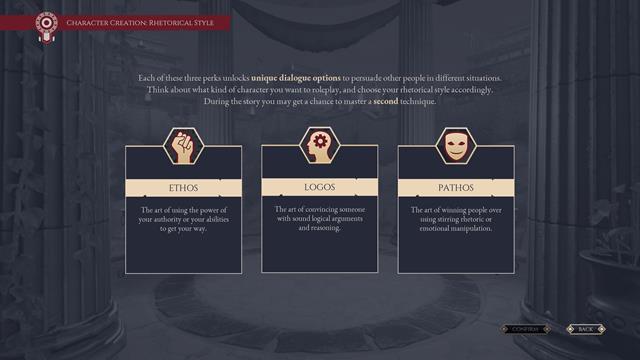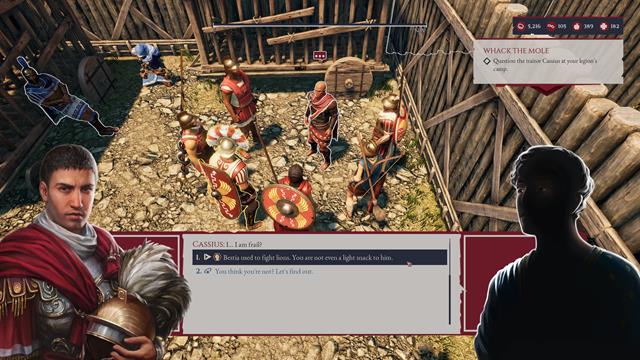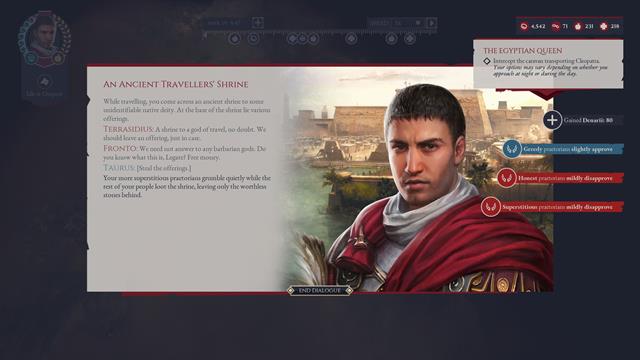Rhetorical Style in Expeditions: Rome impacts dialogue options and recruit approval. Since the game has both strategy and RPG mechanics, you’ll encounter moments where you must choose specific responses throughout the campaign. In some cases, you might earn respect. In others, you may earn the ire of others.
This Expeditions: Rome guide details the game’s Rhetorical Styles, dialogue responses, character personalities, and the loyalty approval system.
Choosing Your Rhetorical Style in Expeditions: Rome

Your Rhetorical Style in Expeditions: Rome can be chosen once you begin the campaign. This is set in stone once you choose and begin the campaign, providing new dialogue options depending on what you picked initially.
Here are the three Rhetorical Style options you can choose from:
- Ethos: The use of power and authority.
- Logos: The use of logical arguments and sound reasoning.
- Pathos: The use of empathy and stirring emotions.
Oddly enough, these kinds of Rhetorical Style occurrences were few and far between. Here are a few notable examples:
- When you talk to Syneros and Geminus on the ship, all three options are available.
- Upon reaching the camp in Mytilene and obtaining a sidequest from Julius Caesar, you’ll see the Ethos option when trying to convince Agrippa. Then, there’s a Pathos option when you talk to Caesar to finish the task.
- When you arrive in the Troas Fishing Village, there’s an NPC that sells an expensive bottle of wine for 2,000 denarii. You can use Logos to lower this to 1,300 denarii. This unlocks the Blood of Jupiter sidequest, which rewards a unique item.
- During the Whack The Mole quest, an Ethos reply lets you intimidate Cassius by talking about Bestia.
- When you reach the Court of Heaven in Act 2, a man named Aksil asks you to risk death and the afterlife. It’s possible to choose a Logos response.
- Also in the Court of Heaven, Bestia will find his long-lost sister. The slave trader wants you to pay 8,000 denarii for her freedom. You can lower this to 2,000 denarii with Logos, but you could just fight the slaver and the other thugs.

Approval: Character Personalities and Dialogue Responses
What’s more common, however, are the multitude of dialogue responses that are presented while interacting with people during quests or whenever random events trigger on the world map. Your dialogue responses here will cause your party members to react depending on their personalities.
Most characters have a combination of three personality traits that you can see in the stats tab of your party menu, and each one is diametrically opposed to another. Here’s the gist of how they line up:
- Honest vs. Cunning: A straightforward approach or a deception?
- Stoic vs. Hedonistic: Become more reserved or indulge in pleasures?
- Skeptical vs. Superstitious: Be wary of the gods and other myths or believe in them and provide offerings?
- Conciliatory vs. Warmongering: Attempt to avoid confrontations or escalate conflicts?
- Humble vs. Arrogant: Accept your shortcomings or show your superiority?
- Generous vs. Greedy: Give resources to those in need or steal/ask for lots of goodies?
- Prideful: They want you to boast of their exploits.
- Sexist: They don’t want you to treat the opposite gender as equal.
- Classist: They don’t want you to acquiesce to the needs of other classes.

Because of those combinations, you’re not always guaranteed to satisfy your party members. You can check your party menu to see the current loyalty and approval ratings in Expeditions: Rome.
Approval ratings have an effect on a character’s morale in battles, as the system implies just how much they value your leadership. At high levels, party members will have improved morale in battles. At lower levels, they might get easily routed or frightened due to the decreased base morale.
Worse, there exists the possibility that characters could leave if their loyalty gets too low. You don’t need to worry about the unique companions since they’ll stay by your side. It’s the generic recruits from the Barracks that you should be concerned with.
A way to keep these recruits around is by building the Bath in your Legion outpost. You can assign a character here and, over time, their approval rating will increase to a certain threshold. There are three tiers for this building chain, and the highest tier will prevent them from going below the Hesitant rating.
Knowing those Rhetorical Styles and how the approval system works for dialogue choices in Expeditions: Rome may not always affect how you interact with your companions, but it gives you a good idea of how to interact with your recruits. For more tips and tricks, consider heading over to our Expeditions: Rome guides hub.







Published: Jan 17, 2022 09:51 am